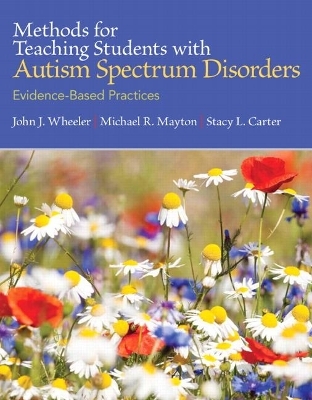
Methods for Teaching Students with Autism Spectrum Disorders
Pearson (Verlag)
978-0-13-707171-5 (ISBN)
Methods for Teaching Students with Autism Spectrum Disorders is the most comprehensive text available, aimed at helping pre-service and in-service teachers and related service professionals understand the importance of evidence-based practices in the education of learners with Autism Spectrum Disorders (ASD) from a family and longitudinal learning perspective. With its emphasis on the theme of family and professional partnerships and collaboration and consultation, the book includes learning aids such as suggested print and web-based resources, graphic organizers, and points for reflection; child and family vignettes, “Consider This” features, and examples of exemplary programs and practices; and the most up-to-date information and latest trends in the field.
Dr. John Wheeler currently serves as Director of the Center of Excellence in Early Childhood Learning and Development and Professor of Special Education at East Tennessee State University.¿ He has had over twenty-five years of experience in working with children with autism spectrum disorders and their families throughout his career in special education.¿ He has authored/co-authored numerous research studies in the education and treatment of children with ASD and serves on a number of editorial boards for professional journals in the field.¿ Most recently he and his co-author David Dean Richey have completed the third edition of their text entitled Behavior Management: Principles and Practices of Positive Behavior Supports also published by Pearson. ¿ Michael R. Mayton, Ph.D., BCBA-D¿is an Assistant Professor of Special Education at West Virginia University where he teaches courses in applied behavior analysis for teachers and supervises the graduate certification program in autism. He is a Board Certified Behavior Analyst who has worked with children in public schools and adults with developmental disabilities in community settings. He has had the honor of being the founding director of the Kelly Autism Program in Bowling Green, Kentucky and providing a range of workshop supports to educators on topics such as identifying and teaching positive replacement behaviors, reducing aggression in young adults with autism, and antecedent management for students with developmental disabilities. His research interests include evidence-based practice assessment and development for people with autism, professional development in special education, and intrusiveness of behavioral treatments for students and adults with disabilities. ¿ Dr. Stacy Carter is an Associate Professor in the Special Education Program at Texas Tech University where he coordinates the Graduate Certificate Program in Applied Behavior Analysis. Dr. Carter is a Board Certified Behavior Analyst, a Nationally Certified School Psychologist, and a licensed special education teacher. He has over fifteen years of experience working with individuals with autism spectrum disorders in developmental centers, psychiatric hospitals, community living situations, and school settings. His research has focused on the development and evaluation of behavior intervention programs for individuals with developmental disabilities and autism. He has published numerous peer reviewed journal articles, book chapters, and a scholarly reference book on social validity.
Section I: Introduction
Chapter 1 Understanding Autism Spectrum Disorders Across the Lifespan
Chapter 2 Determining Evidence-Based Interventions
Section II: Early Childhood
Chapter 3 Identification and Early Intervention
Chapter 4 Teaming with Families
Chapter 5 Teaching Communication Skills
Chapter 6 Methods for Promoting Social Competence
Section III: The School Years
Chapter 7 Building School-Based Behavioral Repertoires
Chapter 8 Collaboration and Consultation
Chapter 9 Developing Academic Skills
Section IV: Moving from School to Adult Life
Chapter 10 Fostering Self-Determination
Chapter 11 Transition to Adulthood
Chapter 12 Enhancing Quality of Life
| Erscheint lt. Verlag | 6.4.2014 |
|---|---|
| Sprache | englisch |
| Maße | 218 x 277 mm |
| Gewicht | 916 g |
| Themenwelt | Sozialwissenschaften ► Pädagogik ► Sonder-, Heil- und Förderpädagogik |
| ISBN-10 | 0-13-707171-X / 013707171X |
| ISBN-13 | 978-0-13-707171-5 / 9780137071715 |
| Zustand | Neuware |
| Haben Sie eine Frage zum Produkt? |